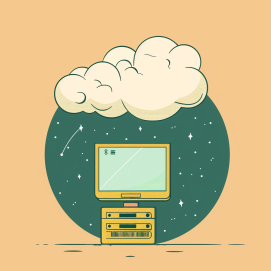Every business relies on IT, it's unavoidable. Here are the top ten things every company needs to implement whether you're a solo-preneur, 2-5 person powerhouse, or 10+ employees and growing.

1. Separation of Personal & Business Computers
If you were to implement only one item on this list of 10, make it this one. This is the toughest sell for solo business operators and it's also the most important first step in developing basic IT structure and practices for your small business. By maintaining separation of personal and business activities using separate computers for each, owners can mitigate the risk of cyber threats infiltrating their business systems through personal activities and, more critically, it can protect your personal information from cyber criminals who might target your business but find it all too easy to take their crimes a step further. You don't necessarily have to have to a separate mobile phone, though it's not a bad idea for your mental health, but prioritize getting an exclusively "work" PC or laptop in your first year of business.
2. Password Management Tool
Having a password management tool for small businesses is like having a reliable, trustworthy, security-crazed assistant who never forgets.
It might feel complicated to set up and a few days to get used to, but it'll ultimately save you the headaches of constantly resetting passwords when you log into those infrequently used sites, increase your base cybersecurity protections two-fold, and the ease of logging into one portal for all passwords will save you precious minutes every day. That time adds up!
3. PC Backups
Think of this as an insurance policy on your computer. You won't appreciate it until you need it, and when you need it you'll be really thankful you had it. Ironically, it's the most critical documents that end up on the desktop or your PC or in a random "sort late" folder in your local documents folder. It makes sense - you're trying to get the client contract out the door and you don't have time to find their company folder in your robust cloud storage, so you plop it on your desktop and forget about it. A few days later, when your computer dies, there's few options to get your data back - and they're usually expensive.
Do yourself a favor and take one or two hours to find a low-cost or managed backup service for your most critical PCs. If you have a server, this is an absolute must.

4. Basic Cybersecurity Training
Do you have 15 minutes while you're eating lunch to improve your IT posture? Sure you do! Every week pick one lunch break to spend on Youtube or Google learning basic cybersecurity concepts like preventing Phishing, Vishing, and Spam emails from impacting your business. The biggest cybersecurity threat to your company is you and your staff - and if you ask any expert they'll tell you the same. Prevention and knowlege are key to understaning how NOT to get tricked and compromised.
5. MFA, 2FA....5FA if it lets you.
Implementing Multi-Factor Authentication (MFA) or Two-Factor Authentication (2FA) may feel like a hassle, but it's equivalent locking your front door - it takes an extra 15 seconds and you wouldn't sleep without it. If you're walking around in real life without MFA enabled on all your accounts, wherever available, you're setting yourself up for a nightmare and leaving yourself vulnerable to the simplest of attacks. Adding an extra layer of protection with MFA or 2FA takes minutes to set up, seconds to complete and saves you hours of tears. It's required by most IT firms to implement (and Microsoft!) for a reason. It saves businesses, simple as that.
6. Battery Backups
Much like PC data backups, this is an added insurance policy for your hardware. Battery backups protect PCs and laptops from potential damage caused by power surges and act as a safeguard by providing a stable power supply during sudden outages or fluctuations in electricity. They help prevent data loss, hardware damage, and system failures that can occur when a computer is abruptly shut down. Though that damage doesn't happen every time, it only takes one time to cause major performance issues. Power related issues aren't always obvious and if you do have IT, you could spend extra time and money troubleshooting your slow PC only to find out a battery backup would have saved you.
7. Reliable Internet (& Internet Speed)
It might be tempting to save overhead costs with a personal internet account rather than a business-class account, but I wouldn't recommend it even if you're a solo-preneur working mostly from home. Opting for business-grade internet ensures the reliability and consistency of internet service and speed you need to be productive and consistent in your business. If your internet does have performance issues or outages, business class support is more helpful and responsive, often offering same day or next day fixes versus several weeks of repeatedly calling and getting offered less-than-than-stellar solutions. Business-class internet is also designed to support the network equipment required for efficient operations, reducing the risk of downtime or performance issues.
8. IT At The Ready
If you're not at the stage where you need regular IT help, that shouldn't stop you from researching IT providers or consultants that can help you in a pinch, hopefully without going through a lengthy sales process before offering to fix your issue. Get aquainted with an expert or two that you could lean on for fast help or, better yet, preventative guidance and support before things get critical.

9. Basic Understanding of AI (Artificial Intelligence)
You don't have to be techy to take advantage of AI just like you don't need to be a mechanic to drive a car. You might be nervous about it, you might try to avoid it, or you might be curious but not yet know how to incorperate AI into your business operations. Well, you don't have to use it yet but the day is coming when AI will be as ingrained into our business lives as PCs and internet are. Find your favorite learning avenue and dive in (safely) to the world of AI. Start small - create a ChatGPT account and ask some simple, non-identifying questions. There are a million ways AI can help you in your daily business life - yes you - you late adopter. Do you have a screenshot with a bunch of text you want extracted into a table? It can do that. Do you want to create a fun cartoon to go with your soial media post? It can do that, too. When you find yourself thinking, "I wish I could afford an assistant." - think ChatGPT.
10. Technical Documentation
Documentation is another one of those pain in the butt, proactive steps you can take before you something critical happens. My suggested note-taking app: Microsoft OneNote. The top thing you should document: Web domain and website information. By documenting the technical processes and applications that keep your business ticking, you're ensuring that your business operations have a solid backbone. It's like giving your business a user manual - one that can be used internally and when you're ready to reach out to an IT service provider. No one can remember everything, but at some point you're going to have to be the one to answer "how do we do x?" or "Who's our domain provider?"
Comentarios